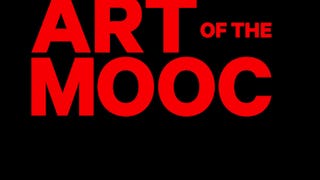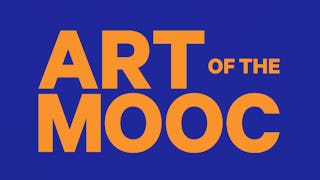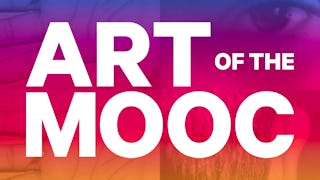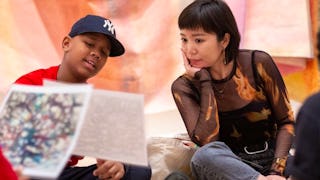Les étudiants de ce cours peuvent s'essayer à leurs propres interventions d'art public, ou simplement se concentrer sur l'apprentissage de la théorie de la pratique publique et de son histoire récente. Conçu par l'artiste et professeur de Duke, Pedro Lasch, et co-enseigné par le directeur artistique de Creative Time, Nato Thompson, ce cours présente la culture et l'art publics sous leurs formes contemporaines radicalement réinventées. Les conférences établissent un lien entre les développements majeurs des dernières décennies et des sujets plus larges tels que la politique spatiale, les structures sociales quotidiennes et l'éducation expérimentale.



L'ART du MOOC : Art public et pédagogie
Ce cours fait partie de Spécialisation L'art du MOOC : Art, culture et société


Instructeurs : Pedro Lasch
18 032 déjà inscrits
Inclus avec 
(126 avis)
Compétences que vous acquerrez
- Catégorie : Relations internationales
- Catégorie : Sciences sociales
- Catégorie : Enseignement supérieur
- Catégorie : Culture
- Catégorie : Pédagogie
- Catégorie : Apprentissage mixte
- Catégorie : Examen par les pairs
- Catégorie : Justice sociale
- Catégorie : Créativité
- Catégorie : Développement communautaire
- Catégorie : Histoire de l'art
Détails à connaître

Ajouter à votre profil LinkedIn
9 devoirs
Découvrez comment les employés des entreprises prestigieuses maîtrisent des compétences recherchées

Élaborez votre expertise du sujet
- Apprenez de nouveaux concepts auprès d'experts du secteur
- Acquérez une compréhension de base d'un sujet ou d'un outil
- Développez des compétences professionnelles avec des projets pratiques
- Obtenez un certificat professionnel partageable

Il y a 7 modules dans ce cours
Ce court module donne un aperçu de la structure du cours, du processus de travail, de la communauté mondiale et des lignes directrices générales. Veillez à le lire immédiatement et à vous y référer en cas de besoin.
Inclus
1 vidéo4 lectures
Cette leçon présentera quelques définitions de base et des exemples de pratiques publiques et d'art socialement engagé, en particulier en ce qui concerne les politiques spatiales. Nous examinerons le rôle critique que ces pratiques ont joué par rapport à diverses formes d'urbanisme et de planification sociale et nous nous pencherons sur les mécanismes physiques et symboliques qui séparent le global et le local, l'urbain et le rural, le visible et l'invisible, les citoyens et les immigrés, les colons et les réfugiés. Les conférences et les présentations des invités serviront de base et d'inspiration aux étudiants pour leurs propres expériences en matière de politique spatiale.
Inclus
8 vidéos1 lecture1 devoir
L'incitation, la conférence et les présentations des invités serviront de base et d'inspiration pour les expériences des étudiants. Ces expériences d'étudiants étaient à l'origine des projets évalués par des pairs dans la série ART du MOOC, mais elles sont maintenant devenues entièrement optionnelles et auto-évaluées. Si vous souhaitez les réaliser, nous vous recommandons de choisir l'une des deux options (l'une est plus sociale, l'autre plus individuelle) et de répondre au questionnaire facultatif une fois que vous aurez terminé. Vos soumissions de projets et le quiz ne sont pas notés, ils n'auront donc pas d'impact sur votre performance dans le cours.
Inclus
2 lectures2 devoirs
Par définition, l'art social est une entreprise collective. Il peut chercher à transformer des structures sociales et des économies plus vastes. Plus modestement, il peut proposer des alternatives ou simplement relever des défis immédiats. La production d'un corps collectif inhabituel, créatif ou engagé peut être son objectif final. Dans cette leçon, nous apprendrons comment les artistes socialement engagés ont utilisé l'apparence ou la forme réelle d'organisations et d'institutions telles que les églises, les entreprises, les banques, les bureaux gouvernementaux et d'autres unités sociales comme support de leur travail. Les éléments pratiques de cette leçon demanderont aux étudiants d'inventer leurs propres structures sociales alternatives ou interventions fictives.
Inclus
9 vidéos1 devoir
L'incitation, la conférence et les présentations des invités serviront de base et d'inspiration pour les expériences des étudiants. Ces expériences d'étudiants étaient à l'origine des projets évalués par des pairs dans la série ART du MOOC, mais elles sont maintenant devenues entièrement optionnelles et auto-évaluées. Si vous souhaitez les réaliser, nous vous recommandons de choisir l'une des deux options (l'une est plus sociale, l'autre plus individuelle) et de répondre au questionnaire facultatif une fois que vous aurez terminé. Vos soumissions de projets et le quiz ne sont pas notés, ils n'auront donc pas d'impact sur votre performance dans le cours.
Inclus
2 lectures2 devoirs
De nombreux artistes socialement engagés s'investissent dans la communication d'idées par le biais de l'éducation ou de projets éducatifs. De Freire et Boal à la Womanhouse de Judy Chicago et Miriam Shapiro, en passant par le programme d'art féministe de CalArts, un bref examen de la pédagogie expérimentale ou radicale et de son influence sur l'art est donc au centre de cette leçon. Utilisant diverses technologies et formes sociales, certaines de ces œuvres visent à transformer l'éducation de l'intérieur. D'autres se positionnent intentionnellement comme des plateformes auto-organisées en dehors des institutions. Nous nous concentrerons sur la manière dont la production de communautés d'apprentissage alternatives peut remettre en question les hiérarchies, la professionnalisation, l'homogénéisation et l'économie des systèmes éducatifs actuels. Les éléments pratiques de cette semaine inviteront les étudiants à repenser leur relation à l'éducation en choisissant entre la socialisation à petite échelle et la collaboration massive.
Inclus
6 vidéos1 lecture1 devoir
L'incitation, la conférence et les présentations des invités fourniront une base et une inspiration pour les propres expériences des étudiants en matière de politique spatiale.L'incitation, la conférence et les présentations des invités fourniront une base et une inspiration pour les propres expériences des étudiants. Ces expériences d'étudiants étaient à l'origine des projets évalués par des pairs dans la série ART du MOOC, mais elles sont maintenant devenues entièrement optionnelles et auto-évaluées. Si vous souhaitez les réaliser, nous vous recommandons de choisir l'une des deux options (l'une est plus sociale, l'autre plus individuelle) et de répondre au questionnaire facultatif une fois que vous aurez terminé. Vos soumissions de projets et le quiz ne sont pas notés, ils n'auront donc pas d'impact sur votre performance dans le cours.
Inclus
2 lectures2 devoirs
Obtenez un certificat professionnel
Ajoutez ce titre à votre profil LinkedIn, à votre curriculum vitae ou à votre CV. Partagez-le sur les médias sociaux et dans votre évaluation des performances.
Instructeurs


En savoir plus sur Musique et art
 Statut : Essai gratuit
Statut : Essai gratuit
Duke University
 Statut : Essai gratuit
Statut : Essai gratuit
Duke University
 Statut : Essai gratuit
Statut : Essai gratuit
Duke University
 Statut : Essai gratuit
Statut : Essai gratuit
The Museum of Modern Art
Pour quelles raisons les étudiants sur Coursera nous choisissent-ils pour leur carrière ?




Avis des étudiants
126 avis
- 5 stars
80,15 %
- 4 stars
15,07 %
- 3 stars
3,96 %
- 2 stars
0 %
- 1 star
0,79 %
Affichage de 3 sur 126
Révisé le 9 nov. 2020
I loved this. The class was very informative and enjoyable. I didn’t realize I would move through the course so fast. Will be taking more courses.
Révisé le 12 août 2020
This course was excellent. The content was really engaging, the tutors were very responsive and the assignments were interesting. I would wholeheartedly recommend it.
Révisé le 10 déc. 2017
Interesting perspective on art I hadn't considered prior to this course. Thanks so much.

Ouvrez de nouvelles portes avec Coursera Plus
Accès illimité à 10,000+ cours de niveau international, projets pratiques et programmes de certification prêts à l'emploi - tous inclus dans votre abonnement.
Faites progresser votre carrière avec un diplôme en ligne
Obtenez un diplôme auprès d’universités de renommée mondiale - 100 % en ligne
Rejoignez plus de 3 400 entreprises mondiales qui ont choisi Coursera pour les affaires
Améliorez les compétences de vos employés pour exceller dans l’économie numérique
Foire Aux Questions
Non. L'achèvement d'un cours Coursera ne vous donne pas droit à un crédit académique de Duke ; par conséquent, Duke n'est pas en mesure de vous fournir un relevé de notes universitaire. Cependant, votre certificat électronique sera ajouté à votre page Accomplishments - à partir de là, vous pouvez imprimer votre certificat ou l'ajouter à votre profil LinkedIn.
L'accès aux cours et aux devoirs dépend de votre type d'inscription. Si vous suivez un cours en mode audit, vous pourrez consulter gratuitement la plupart des supports de cours. Pour accéder aux devoirs notés et obtenir un certificat, vous devrez acheter l'expérience de certificat, pendant ou après votre audit. Si vous ne voyez pas l'option d'audit :
Il se peut que le cours ne propose pas d'option d'audit. Vous pouvez essayer un essai gratuit ou demander une aide financière.
Le cours peut proposer l'option "Cours complet, pas de certificat" à la place. Cette option vous permet de consulter tous les supports de cours, de soumettre les évaluations requises et d'obtenir une note finale. Cela signifie également que vous ne pourrez pas acheter un certificat d'expérience.
Lorsque vous vous inscrivez au cours, vous avez accès à tous les cours de la Specializations, et vous obtenez un certificat lorsque vous terminez le travail. Votre certificat électronique sera ajouté à votre page de réalisations - de là, vous pouvez imprimer votre certificat ou l'ajouter à votre profil LinkedIn. Si vous souhaitez uniquement lire et visualiser le contenu du cours, vous pouvez auditer le cours gratuitement.
Plus de questions
Aide financière disponible,



